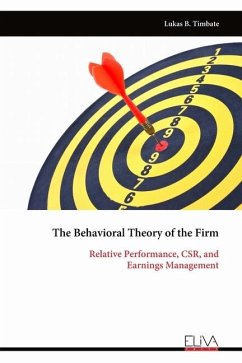The relationship between CSR and earnings management has got vast attention among the researchers examining whether CSR signals an agency problem or ethical management. The extant literature provides mixed and inconsistent results supporting both agency problem and ethical management perspectives. Numerous scholarly works show that CSR may boost firm performance. However, it is not clear whether firms are strategically using CSR to improve their performance and also engaging in earnings management, and why only ethical managers show better CSR performance. Moreover, while organizations and professionals consider the type, size, timing, and purpose of earning management in deciding whether it is unethical practice, the existing literature focuses only on the size of earnings management. This study, borrowing a concept from a behavioral theory of the firm (BTOF), attempts to show a more refined model on the relationship between CSR and earnings management. Using data from a sample of S&P 1500 firms for the period covering 2010 through 2017, the current study documents pieces of evidence possessing significant contributions and implications for the BTOF, earnings management and CSR literature. First, motivated by the desire to improve subsequent performance and reclaim status quo, firms performing below aspiration level are more likely to show better CSR performance than firms performing above aspiration. Second, income-increasing earnings management is more likely to happen when the firm's performance falls below its aspiration in the prior period and income-decreasing earnings management is related to better performance relative to aspiration. Third, despite the finding that firms performing below aspiration are more likely to show better CSR performance than above aspiration performers, subsequent tests do not provide evidence that CSR performance is related to agency problem or ethical management. However, the findings indicate that firms' desire to engage in CSR may emanate from its contribution in building firms' image and reputation, and subsequently improving performance and productivity rather than just hiding earnings management or serving the society.
Bitte wählen Sie Ihr Anliegen aus.
Rechnungen
Retourenschein anfordern
Bestellstatus
Storno



